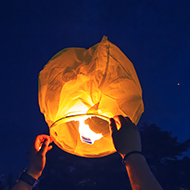
Gorillas, orangutans and chimps perish in blaze
A fire in the early hours of New Year’s Day has resulted the deaths of around 30 animals at Krefeld zoo in west Germany. The fire was most likely caused by Chinese sky lanterns, which are banned in Germany.
In a post on Facebook, the zoo’s management stated: “Our worst fears have become reality.”
Police suspect that Chinese sky lanterns were set off nearby as part of a New Year’s Eve celebration, ultimately landing in the zoo. Local residents reported seeing the lanterns flying near the zoo and called emergency services at 0.38am when they spotted the fire.
Fire services arrived promptly, but the tropical monkey sanctuary was already engulfed in an uncontrollable fire. By the time the blaze had been contained, the building had burned down to its skeletal structure.
The 2,000 square metre sanctuary was home to dozens of primates, including chimpanzees, marmosets and rare Bornean orangutans, as well as numerous tropical birds and fruit bats. German media reported that the oldest living silverback gorilla in the European endangered species breeding programme, 48-year-old Massa, had died in the fire.
A nearby open-air enclosure housing a silverback gorilla and its family remained untouched and two chimpanzees were later discovered to have survived the fire.
Hand-written messages, possibly from the Chinese lanterns, have been found near the enclosure, and several people who may be responsible have handed themselves into police.
According to the Guardian, German law currently allows people to light their own fireworks in public on 31 December and 1 January, but opposition to this tradition has been growing in recent years, with around 30 German districts imposing partial bans on private fireworks in 2019.



 BSAVA is to partner with BVA Live (11-12 June 2026) to champion clinical research.
BSAVA is to partner with BVA Live (11-12 June 2026) to champion clinical research.